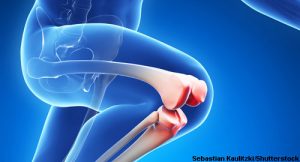 Although researchers have investigated cathepsin K inhibitors as potential treatments for osteoporosis, the development of many potential compounds has stopped due to its association with the increased frequency of morphea or stroke. A recent study found the novel cathepsin K inhibitor MIV-711 both significantly reduces bone and cartilage progression and has a reassuring safety profile. However, MIV-711 was no more effective than placebo for pain.
Although researchers have investigated cathepsin K inhibitors as potential treatments for osteoporosis, the development of many potential compounds has stopped due to its association with the increased frequency of morphea or stroke. A recent study found the novel cathepsin K inhibitor MIV-711 both significantly reduces bone and cartilage progression and has a reassuring safety profile. However, MIV-711 was no more effective than placebo for pain.
The findings by Philip G. Conaghan, MBBS, PhD, professor of musculoskeletal medicine, Leeds University, U.K., and colleagues suggest MIV-711 should be investigated as a disease-modifying osteoarthritis (OA) drug. The investigators published their findings in the January 2020 issue of the Annals of Internal Medicine.1
The Study
The investigators screened 433 patients with primary knee OA and identified 244 who were on a stable analgesic regimen. Most participants were female (76.7%) and white (99.2%). The investigators randomly assigned patients to one of three groups: 100 mg/day of MIV-711, 200 mg/day of MIV-711 or placebo. Treatment adherence was 100% in all study groups. The primary outcome was pain improvement. Ultimately, although average pain severity in the target knee decreased in both treatment groups, the difference in pain after treatment was not statistically significant.
For the secondary outcome, the researchers evaluated 204 participants using extremely sensitive magnetic resonance imaging (MRI) techniques. They found statistically significant attenuation of femoral bone area progression, as well as a reduction of femoral cartilage thinning, in the active treatment groups compared with placebo. Specifically, they documented an attenuation of thinning of medial femoral joint cartilage of 0.066 mm in the MIV-711 groups compared with placebo.
The study also included measures of the biomarkers type I collagen C-telopeptide (CTX-1) and CTX-II as predictors of OA progression. At week 26, the researchers documented significant changes in these bone and cartilage biomarker levels in both MIV-711 groups compared with placebo. When compared with baseline, levels of CTX-I (serum) and CTX-II (urine) were reduced by 27.8% and 34.4% in the 100 mg group and by 50.3% and 51.6% in the 200 mg group. Levels of both biomarkers returned to baseline values after treatment stopped at week 26.
The researchers report that treatment-emergent adverse events were similar across all groups: 55% for placebo, 54.9% for 100 mg/day and 52.4% for 200 mg/day. None of the adverse events were treatment related. Most of the events were mild (46.9%) or moderate (50.7%), and included nasopharyngitis, osteoarthritis and headache. Nine serious adverse events occurred in six participants: one in the placebo group, three in the 100 mg/day group and two in the 200 mg/day group. Serious adverse events included atrial fibrillation, acute cholecystitis, prinzmetal angina, compression fracture, confusion, cerebral infarction and hematoma. The investigators found no cases of morphea associated with MIV-711. There were also no clinically meaningful changes in vital signs, such as blood pressure, electrocardiographic assessments or key laboratory measures in the groups.
Patients treated with MIV-711 did have increases in parathyroid hormone levels and decreases in calcium levels, findings that were consistent with the expected mechanism of action of MIV-711.
The researchers concluded their paper by calling for future studies to determine if the structural benefits they observed will translate into more tangible benefits on OA symptoms.
Lara C. Pullen, PhD, is a medical writer based in the Chicago area.
Reference
- Conaghan PG, Bowes MA, Kingsbury SR, et al. Disease-modifying effects of a novel cathepsin K inhibitor in osteoarthritis: A randomized controlled trial. Ann Intern Med. 2020 Jan 21;172(2):86–95.

